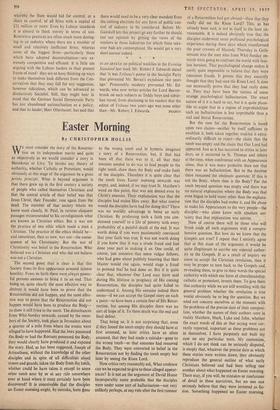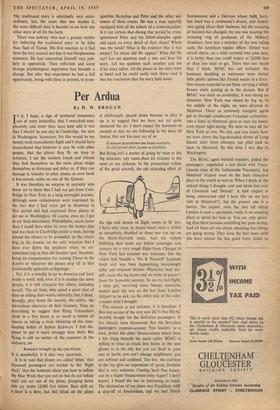Easter Morning
By CHRISTOPHER HOLLIS
WE must consider the story of the Resurrec- tion on its independent merits and quite as objectively as we would consider a story in Herodotus or Livy. To invoke any theory of
authority., whether Catholic or Protestant, would obviously at this stage of the argument be a gross petitio principii. What is beyond argument is that there grew up in the first century a society of people who called themselves Christians and that the central article of their belief was that Jesus Christ, their Founder, rose again from the dead. The member of that society whom we know most closely, St. Paul, in various eloquent passages recommended to his co:religionists what are known as Christian ethics. But it was not the practice of one ethic which made a man a Christian. The practice of the ethics should be— and sometimes, then as now, was not—the conse- quence of his Christianity. But the test of Christianity was belief in the Resurrection. Who believed was a Christian and who did not believe was not a Christian.
The second point that is clear is that this Society from its first appearance aroused intense hostility. From its birth there were always power- ful persons anxious to bring it to an end. That being so, quite clearly the most effective way to destroy it would have been to prove that the Resurrection did not happen, and the most effec- tive way to prove that the Resurrection did not happen would have been to produce the Body— to show it still lying in the tomb. The disturbances from Whit-Sunday onwards, caused by the mem- bers of the Society, took place in Jerusalem about a quarter of a mile from where the events were alleged to have happened. Had the Jews possessed the Body or had the Romans possessed the Body, they would clearly have produced it and exposed the story. Had, as has been suggested, Joseph of Arimathaea, without the knowledge of the other disciples and in spite of all difficulties about stones and guards, taken the Body from the tomb, whither could he have taken it except to some other tomb near by or at any rate somewhere near at hand where it must certainly have been discovered? It is conceivable that the disciples on Easter morning might, by mistake, have gone to the wrong tomb and in hysteria imagined a story of a Resurrection, but, if that had been all that there was to it, all that their enemies needed to do was to lead people to the right tomb, show them the Body and make fools of the disciples. Therefore it is quite clear that the tomb from Easter morning onwards was empty, and, indeed, if we may trust St. Matthew's word on this point, that was not denied even by Christ's enemies. Their explanation was that the disciples had stolen Him away. But what motive would the disciples have had for doing this? There was no worldly advantage in being an early Christian. By professing such a faith you con- demned yourself to a life of poverty with every probability of a painful death at the end. It was worth doing if you were passionately convinced that your faith was true. It was not worth doing if you knew that it was a crude fraud and had done your part in making it so. One could, of course, just conceive that some vulgar fellows, who had gone about publicly boasting that their Master would rise again, would stage a fraud to pretend that he had done so. But it is quite clear that, whatever Our Lord may have said during His lifetime in prophecy of His coming Resurrection, the disciples had quite failed to understand it. Among His enemies indeed there seems—if we can accept the Gospel story on such a point—to have been a certain fear of His Resur- rection, but among His disciples there was no sort of hope of it. To them death was the end and final defeat.
That being so, it is not surprising that, even if they found the tomb empty they should have at first assumed, as later critics have so often assumed, that they had made a mistake—gone to the wrong tomb—or that someone had removed the Body. They were converted to belief in the Resurrection not by finding the tomb empty but later by seeing the Risen Lord.
Now critics very reasonably ask, What credence can we be expected to give to these alleged appear- ances? Is it not on the argument of David Hume incomparably more probable that the disciples were under some sort of hallucination—not very unlikely perhaps, at any rate after the first rumour of a Resurrection had got abroad—than that they really did see the Risen Lord? This, as has already been said, is not in itself in the least un- reasonable. It is indeed obviously true that the disciples underwent some profound psychological experience during these days which transformed the poor cravens of Maundy Thursday in Geth- semane into the men who from Whit-Sunday on- wards were going to confront the world with fear- less heroism. That psychological change makes it surely quite impossible to believe that they were conscious frauds. It proves that they sincerely thought that they had seen the Risen Lord. It does not necessarily prove that they had really done so. They may have been the victims of some strange psychological hallucination. The exact nature of it it is hard to say, but it is quite plaus- ible to argue that in a region of improbabilities such an hallucination is less improbable than a real and literal Resurrection.
But the case for the Resurrection is based upon two claims—neither by itself sufficient to establish it, both taken together making it extra- ordinarily difficult to reject—the claim that the tomb was empty and the claim that Our Lord had appeared. Just as it has occurred to critics in later days, so it occurred to St. Thomas and others at the time, when confronted with an Appearance alone, that it was more probable than not that there was an hallucination. But to the doubter there remained the obstinate question: If this is not the Body, where then is the Body? For the tomb beyond question was empty and there was no natural explanation where the Body was that even began to hold water other than the explana- tion that the disciples had stolen it, and He chose to make his Appearances to the very people—the disciples—who alone knew with absolute cer- tainty that that explanation was untrue.
Now of course there will be those who will brush aside all such arguments with a compre- hensive question. But how do we know that the gospels are true? I repeat that I entirely agree that at this stage of the argument it would be quite illegitimate to ascribe any especial author- ity to the Gospels. If as a result of inquiry we come tQ accept the Christian revelation, then it may be proper to turn back to the Gospels and, re-reading them, to give to their words the special authority with which our form of churchmanship, catholic or protestant, invests them. To give them that authority while we are still wrestling with the general problem whether the revelation is true would obviously be to beg the question. But we need not concern ourselves at the moment with the problems of the precise date of their composi- tion, whether the names of their authors were in reality Matthew, Mark, Luke and John, whether the exact words of this or that saying were cor- rectly reported, important as these problems are in themselves. I have purposely not built my case on any particular texts. My contention, which' I do not think can be seriously disputed, is simply that, whatever the precise date at which these stories were written down, they obviously reproduce the general outline of what early Christians believed and had been telling one another about what happened on Easter morning.
There may, if you will, be mistakes or confusions of detail in these narratives, but no one can seriously believe that they were invented as fie.. tion. Something happened on Easter morning.
The traditional story is admittedly very extra- ordinary, but, the more that one studies it, the more difficult does it become to see how any other story at all fits the facts.
There was nobody who had a greater motive for believing the traditional story to be false than Saul of Tarsus. His first reaction to it had been the very natural one that it was blasphemous nonsense. He had committed himself very pub- licly to opposition. Then reflection and some strange psychological experience had brought a change. But after that experience he had a full opportunity, living with them in private, to cross- question Barnabas and Peter and the other wit- nesses of these events. He was a man superbly equipped with all the talents of a cross-examiner. Is it not certain that during that period he cross- questioned Peter and his fellow,disciples again and again on every detail of their claim? Where was the tomb? What is the evidence that it was empty? To whom did He appear? What did He say? Let me question such a one and hear his story. Let me question such another and see if his story tallies. All the places in the story were at hand and he could easily visit them—and it was his conclusion that the story held water.



































 Previous page
Previous page